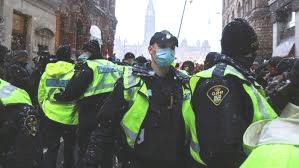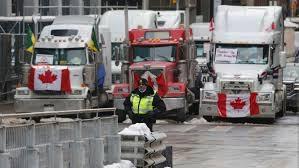 Authorities in Canada have reacted with determination to end the so-called “Freedom Convoy” by truckers and supporters. A declaration of a state of emergency in Ontario was issued by Premier Doug Ford concurrently with an action statement by Drew Dilkens the Mayor of Windsor, Ont., that trucks would be towed and the convoy dispersed. This action was followed on February 14th by an Emergency Declaration by Justin Trudeau, the Prime Minister of Canada confirming his determination to end protests.
Authorities in Canada have reacted with determination to end the so-called “Freedom Convoy” by truckers and supporters. A declaration of a state of emergency in Ontario was issued by Premier Doug Ford concurrently with an action statement by Drew Dilkens the Mayor of Windsor, Ont., that trucks would be towed and the convoy dispersed. This action was followed on February 14th by an Emergency Declaration by Justin Trudeau, the Prime Minister of Canada confirming his determination to end protests.
On Friday February 11th a Federal judge issued an injunction against the protestors allowing authorities including the RCMP and local police agencies to disburse demonstrators and impose fines on drivers and tow away vehicles. Those defying orders to disburse were potentially subject to severe penalties with fines up to $100,000 and a year in detention in addition to loss of licenses and insurance. Premier Ford stated, “Let me be as clear as I can, there will be consequences for these actions and they will be severe. We have already started by going after the money funding the illegal occupation.” The blockades at various border crossings and in the capital, Ottawa were largely dispersed by Sunday 20th February.
 Protests commenced in January following a requirement that cross-border truckers should provide proof of COVID vaccination. It is a matter of fact that 90 percent of all truckers in Canada are fully vaccinated. Protest by a minority of trucker attracted support from Canadian citizen aggrieved over anti-COVID regulations including masking, notwithstanding the fact that 80 percent of citizen of that Nation are fully vaccinated and are generally compliant with health advisories. The truckers’ protests evoked a combative response among some Canadians who are generally recognized for their acceptance of authority and a peaceful approach to social and political issues. The fact that police engaged in negotiations and that there were few counter-demonstrations attests to the spirit of compromise and understanding existing in Canada. Only following the realization that the blockades were impacting daily life and resulting in factory shutdowns did authorities act decisively and then with due regard to law.
Protests commenced in January following a requirement that cross-border truckers should provide proof of COVID vaccination. It is a matter of fact that 90 percent of all truckers in Canada are fully vaccinated. Protest by a minority of trucker attracted support from Canadian citizen aggrieved over anti-COVID regulations including masking, notwithstanding the fact that 80 percent of citizen of that Nation are fully vaccinated and are generally compliant with health advisories. The truckers’ protests evoked a combative response among some Canadians who are generally recognized for their acceptance of authority and a peaceful approach to social and political issues. The fact that police engaged in negotiations and that there were few counter-demonstrations attests to the spirit of compromise and understanding existing in Canada. Only following the realization that the blockades were impacting daily life and resulting in factory shutdowns did authorities act decisively and then with due regard to law.
U.S. trade organizations representing industry and agriculture urged action by provincial governments and Federal authorities to end the blockades. An unfortunate aspect of the blockade was the clandestine financial support and overt encouragement provided by right-wing protestors against COVID restrictions and some media in the U.S., notwithstanding the damage that was caused to U.S. agriculture and industry and specifically auto assembly in Michigan.
It is hoped that action by Canadian authorities and condemnation by U.S. associations representing industry and agriculture will avert similar copy-cat protests in the U.S.